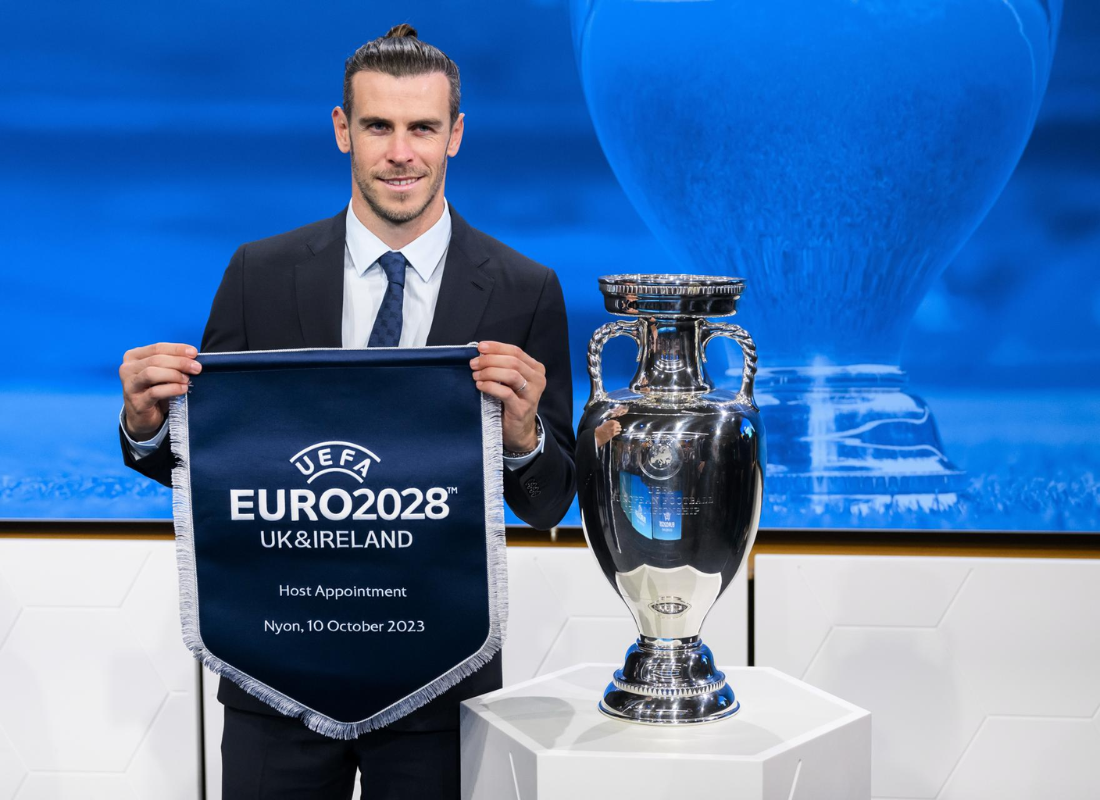The UK and Ireland’s bid for Euro 2028 encountered no rivals when Turkey decided to shift its focus to a joint bid with Italy for Euro 2032. The tournament will comprise six stadiums in England and one in each of Northern Ireland, the Republic of Ireland, Scotland, and Wales. Only two host nations will receive automatic qualification for the event.
The UEFA executive committee gave the green light to the uncontested proposal from the five nations, as Turkey withdrew to concentrate on their joint bid with Italy for Euro 2032. The UK and Ireland’s bid, submitted in April, featured ten stadiums for Euro 2028, with six of them located in England, and one each allocated to Northern Ireland, the Republic of Ireland, Scotland, and Wales.
The tournament is set to take place in June and July 2028, marking exactly seven years since England and Scotland co-hosted games during the rescheduled event held across Europe.
Newyddion gwych! Fantastic to hear that Wales will host @UEFA #EURO2028 matches following the successful joint UK and Ireland bid.
— Mark Drakeford (@PrifWeinidog) October 10, 2023
Together, we'll deliver an unforgettable and spectacular tournament – showcasing the best Cymru has to offer.@FAWales pic.twitter.com/RuDzJiLuZI
Mark Bullingham, the CEO of the FA, shared his excitement with Sky Sports, stating, “We’re ecstatic about this. It’s been three years of dedicated work to get to where we are now. This is an incredible accomplishment for us, as well as for the entire nation, including the home nations and Ireland. We’re eagerly looking forward to the tournament. Our bid was meticulously crafted with significant effort, and we believe this is why we didn’t face any competition in the end.”
The following stadiums in the UK and Ireland have been selected to host Euro 2028:
- Wembley Stadium (London)
- Principality Stadium (Cardiff)
- Tottenham Hotspur Stadium (London)
- Etihad Stadium (Manchester)
- Everton Stadium (Liverpool)
- St James’ Park (Newcastle)
- Villa Park (Birmingham)
- Hampden Park (Glasgow)
- Aviva Stadium (Dublin)
- Casement Park (Belfast)
UEFA expects Euro 2028 to yield higher revenue than any other major tournament, including Euro 2032.
How will host nations secure their spots in the tournament?
UEFA supports the notion that all five countries should take part in the qualification process, with two automatic berths reserved for those who do not qualify through the usual qualifiers.
The FA’s objective is to maintain England’s competitiveness by participating in the qualifying matches, avoiding two years of friendly games. Mark Bullingham, in his conversation with Sky Sports, expressed, “From our standpoint, it’s crucial to engage in the qualification process, and we aspire to have all teams included. Playing in a tournament with meaningful matches is more advantageous, and we’re eagerly looking forward to that.”
“We’ve consistently discussed with the other nations and UEFA that we would be part of the qualification process. Given the new format of European football, we believe it’s the correct approach,” Bullingham emphasized.
To illustrate, in a scenario where three out of the five countries failed to secure qualification, deciding which two of those three should progress to the tournament would pose a considerable challenge.
A possible remedy might involve granting a “wild card” entry to the two countries that demonstrated the strongest performance throughout the qualification process.
Where will the matches take place?
In England, there are six designated venues: Wembley, the Tottenham Hotspur Stadium, the Etihad Stadium, St James’ Park, Villa Park, and the upcoming Everton stadium at Bramley-Moore Dock, which is currently in the construction phase.
The proposal also encompasses a renovated Casement Park in Belfast, the Aviva Stadium in Dublin, Hampden Park in Glasgow, and the Principality Stadium in Cardiff.
The tournament will involve 24 teams participating in 51 matches. Among these, 28 games are set to occur in England, with six each taking place in Scotland, Wales, and Ireland, in addition to five in Northern Ireland. The opening match is expected to be held in Cardiff, while the semi-finals and final are slated for Wembley.
Quarter-finals are scheduled to be hosted at Wembley, as well as in Wales, Scotland, and Ireland.
Mark Bullingham commented, “This partnership is extremely advantageous. We acknowledge that Northern Ireland will host five games, while Wales, Scotland, and Ireland will each host six. It’s fantastic that these countries will have a substantial allocation of matches, particularly if they have some hosted on their home turf, which will be tremendously exciting for the nations.”
Will Casement Park be ready on schedule?
A major issue at hand concerns the refurbishment of Casement Park, which currently stands in a state of disrepair. The plans by the Gaelic Athletic Association to reconstruct it into a 34,000-seat stadium have been marred by controversies and substantial delays.
The Casement project has encountered setbacks due to an array of legal disputes, and the absence of an operational government executive at Stormont further complicates matters.
Furthermore, the redevelopment has been hindered by continuously rising expenses. The original estimated cost, which dates back nearly a decade at £77.5 million, is now believed to have ballooned significantly, surpassing £100 million.
Although the GAA is contributing to the project’s funding, an agreement with Stormont on how to address a substantial budget shortfall in the multi-million-pound range has yet to be reached.
Is there worry about Wembley hosting the final?
“The UEFA executive committee has received assurances from The FA that they are implementing measures to prevent a repeat of the chaotic incidents witnessed at Wembley during the Euro 2020 final.
“Those who were present that day will surely remember the distressing situation. Security was notably insufficient, resulting in a significant number of individuals gaining entry to the stadium without tickets. An official report even suggested that it was nearly a miracle that no lives were lost.
“The FA claims to have learned from these lessons and is determined to ensure that such an occurrence does not recur. UEFA’s confidence in The FA is evident, as they have entrusted them with hosting the Champions League final at Wembley later this season.
“However, it’s not just The FA facing scrutiny; the incidents during the last two Champions League finals in Paris and Istanbul have also raised substantial concerns. I attended both, and numerous supporters, particularly those of Liverpool and Manchester City, have expressed a lack of trust in UEFA. They are hesitant to attend major events organized by the organization.
“As a result, there are not only questions for The FA but also significant queries for UEFA and its executive committee regarding their suitability for hosting major tournaments and finals.”
UEFA’s Confidence in Delivering an Exceptional European Championship
Speaking about concerns regarding Wembley’s suitability to host the Euro 2028 final in light of past issues, Bullingham assured: “This was indeed a topic of discussion during Baroness Casey’s review, and we comprehensively addressed all aspects during that period.
“UEFA expressed their confidence in our preparations at that time, and it has not been a major point of contention for them since. They are well aware of the significant investments we’ve made in upgrading the stadium. They have complete faith in our capability to deliver an exceptional Euro tournament, which is precisely our intention.
“We take great pride in our stadium, viewing it as an exceptional venue for hosting major events, and we are pleased that UEFA shares this perspective.”
ALSO READ:
- Maurice Steijn angered by Ajax’s free laser treatment, calls for action
- Messi’s Late Goal Saves Miami, Securing Draw vs LA Galaxy
- Pochettino praises Gallagher as ‘key’ in Chelsea’s comeback win











